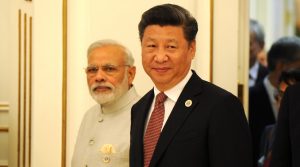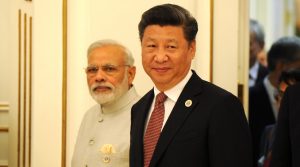
Days before the first-ever informal summit meeting between Prime Minister Narendra Modi and Chinese President Xi Jinping, China’s One Belt One Road project continue to remain a subject of contention. New Delhi has refrained from expressing support for the mammoth trans-regional connectivity project at the meeting of the foreign ministers of the Shanghai Corporation Organization.
India’s External Affairs Minister Sushma Swaraj participated in the SCO foreign ministers’ meeting in Beijing, and discussed a host of regional issues, including terrorism, ahead of the SCO summit in June, which will be attended by Mr Modi.
The Joint Communique which was issued at the end of the SCO foreign ministers’ meeting expressed unity on issues ranging from support to Iran’s nuclear deal, combating extremist terrorism and the rising trend of protectionism. However, India did not join other SCO countries including Russia, Pakistan, Kazakhstan, Kyrgyzstan, Tajikistan and Uzbekistan,who reiterated their support for the BRI.
“The parties support the use of the potential of countries, international organisations and multilateral institutions in the region to establish a broad, open and mutually beneficial partnership in the SCO region”, read the joint statement issued by the SCO ministers.

India has consistently opposed OBOR on grounds that its offshoot, China-Pakistan Economic Corridor, passes through the Pakistan Occupied Kashmir, and hence amounts to violating India’s sovereignty.
India has also opposed BRI on grounds that the project is not transparent and is not backed by prudent financing and principles of sustainable development. These are ostensible grounds cited by India for opposing BRI, but India’s real concern is that the BRI project is designed to advance China’s big power ambitions.
At the SCO meeting, Mrs Swaraj showcased India’s connectivity projects, which indicate that India will like to shape trans-regional connectivity on its own terms. The minister highlighted a wide array of connectivity projects that India is successfully executing in different countries. She mentioned the progress on Chabahar port development, India-Myanmar-Thailand highway, Bangladesh-Bhutan-India-Nepal initiative and the International North-South Transport Corridor.
India’s decision to refrain from backing OBOR at the SCO meeting signals underlying difficulties in India-China relationship and indicates the challenge both PM Modi and President Xi face as they try to pitch the troubled relationship on a positive trajectory.
Mr Modi and Mr Xi will have their first informal summit on the banks of the Yangtze river in the central Chinese city of Wuhan on April 17-18. The format of the informal summit has been designed to allow free flowing conversation between the leaders of the two Asian powers to reorient the relationship that suffered severe stress in the wake of the 73-day standoff at the Doklam plateau in the summer of 2017.
There is no set agenda for the informal summit, and it will be up to the leaders to focus on the issues they want to reset the India-China relationship, said sources. The idea is to have a leaders’ driven conversation that will help defuse the deadlock on a host of contentious issues in the long run and help widen areas of cooperation between the two emerging economies.
Author Profile

- Manish Chand is Founder and Editor-in-Chief of India Writes Network (www.indiawrites.org) and India and World, a pioneering magazine focused on international affairs. He is CEO, Centre for Global India Insights, an India-based think tank focused on global affairs.
Latest entries
 India and the WorldFebruary 27, 2026Modi visit: India-Israel partnership enters a new era
India and the WorldFebruary 27, 2026Modi visit: India-Israel partnership enters a new era India and the WorldFebruary 24, 2026Unravelling Modi’s Israel journey: What to expect
India and the WorldFebruary 24, 2026Unravelling Modi’s Israel journey: What to expect India and the WorldFebruary 17, 2026South-by-South: Focus on people-centric solutions at India AI summit
India and the WorldFebruary 17, 2026South-by-South: Focus on people-centric solutions at India AI summit India and the WorldFebruary 7, 2026Modi hails interim India-US trade deal, Goyal says no concessions made on agriculture
India and the WorldFebruary 7, 2026Modi hails interim India-US trade deal, Goyal says no concessions made on agriculture







